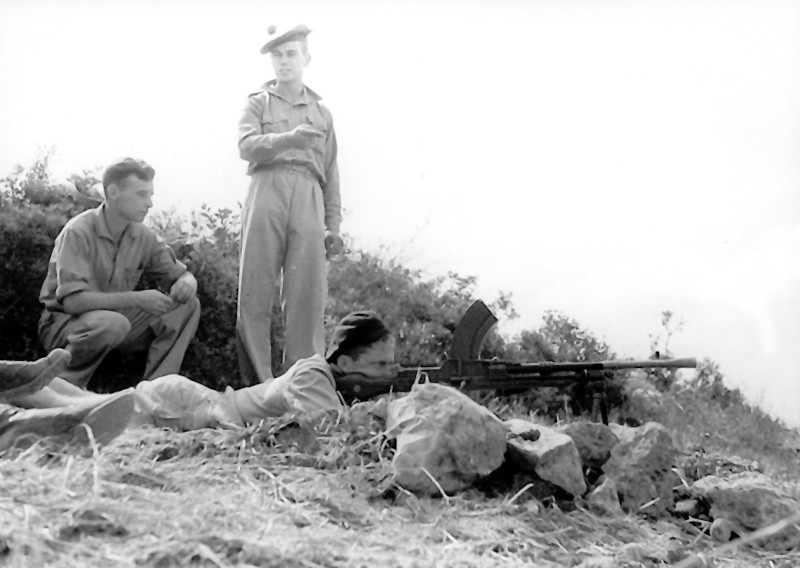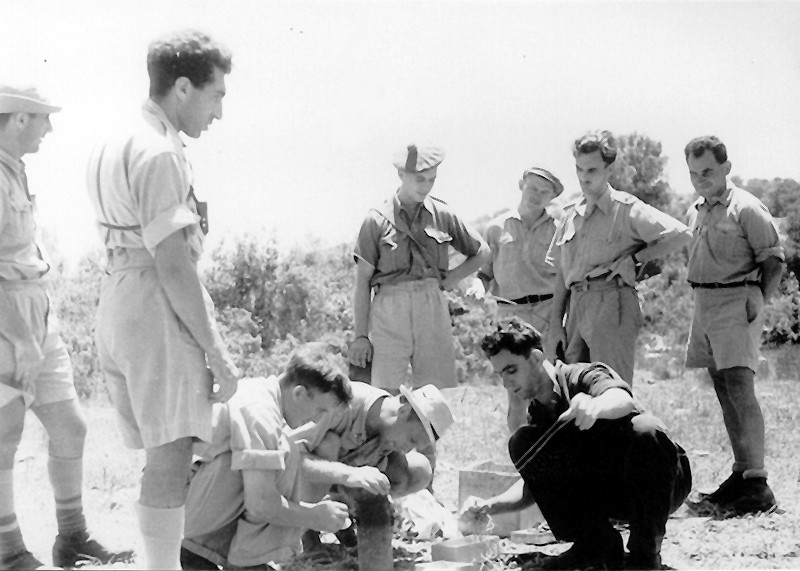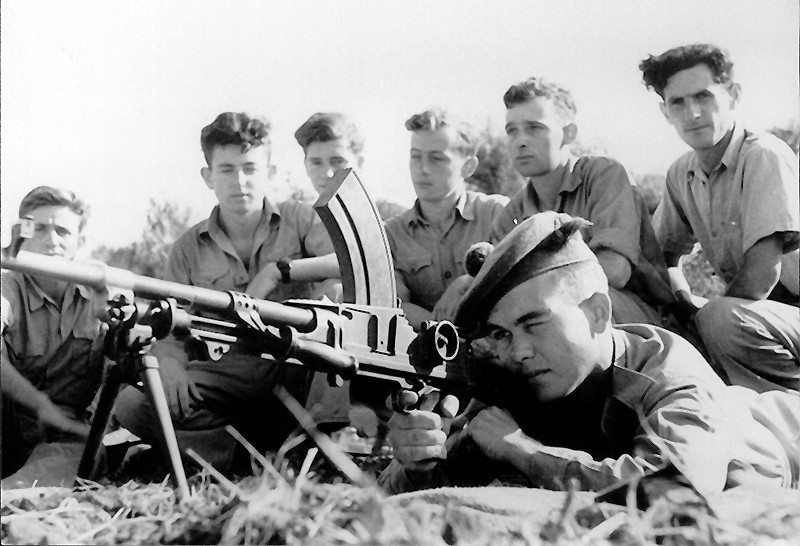Cooperation with the British
The establishment of the Palmach was one of the manifestations of the cooperation between Britain and the Jewish Yishuv in Palestine during World War II.
The establishment of the Palmach was one of the manifestations of the cooperation between Britain and the Jewish Yishuv in Palestine during World War II. It was preceded by a tradition of Zionist – British cooperation even before Britain ruled in Palestine, when it offered Uganda to the Zionist Movement in 1904 as a political-territorial solution, and when they published the Balfour Declaration in 1917 on the eve of their invasion of Palestine. Military cooperation had also taken place beforehand: Jewish Battalions joined the British army during WWI ( 1915 - 1919), and the British recruited Jewish police officers to the Mandate police. Together they founded the Special Night Squads during the Arab Riots (1936 - 1939), when the British and the Hagana had a common interest in ending Arab aggression.
During WWII, Nazi Germany became a common enemy of the Zionist movement and the British, by declaring war on the Jewish nation (in1933) and on Britain (in1939.) With the advance of the war fronts towardsEretz Israel, another common interest arose – defending Eretz Israel from the Axis (German-Italian) armies and their satellites and/or preventing the local Arabs from joining Germany against the Jewish Yishuv and British rule.
The main manifestation of the common interests was the recruitment of individuals into various units in the British army and, before the end of the war, to the Jewish Brigade Group - (HaChayil). Alongside recruitment was the primarily intelligence, cooperation between the Jewish Agency and British military factions. This cooperation was called " Cooperation." Part of it included the intelligence activities of Hagana members in Syria and Lebanon against the German satellite Vichy government, which became the "Syrian Scam" (S.S.), Later on military cooperation was set up in order to plan resistance to the Axis (German-Italian) armies should they invadePalestine. This was part of the Palestine Scam (P.S.) and later on the Palestine Post-Occupation Scam (P.P.O.S)
Operations led by “Mistaarvim” (armed forces disguised as Arabs) detachments in Syria and Lebanon, for intelligence and sabotage purposes, began as early as 1940. The loss of 23 Hagana members, whose boat was lost with their British escort on their way to an operation in Lebanon (May1941) and the patrol detachments that led the invasion into Syria and Lebanon, in which the Palmach took part (June 1941), were all executed in this framework. The British were impressed by the readiness and ability shown in those operations and took up the Agency's offer of planning minor warfare tactics against the Germans should the country be invaded, and training them for sabotage, sniping and patrol missions. Thus the" Cooperation" made the full recruitment of the Palmach companies possible. 147 combatants from all Palmach units participated in the main course at Mishmar Haemek forest in April 1942, as well as in courses that took place elsewhere.
In the summer of 1942, the danger of invasion of Palestine was again imminent following the Axis Armies’ attack on the North-Africanfront. A general call-up was declared throughout the Jewish Yishuv in Eretz Israel, among them the Palmach units, who were kept on standby in their bases in the settlements. In early July their deployment was changed and A and B companies were transferred south to help block the German army advance from the south. As the"Axis" attack was warded off, cooperation slowly diminished until, finally, the British refused to continue it and stopped funding the up-keep and training of Palmach units.. The Palmach faced the danger of being dismantled with the cessation of the "Cooperation". It was essential to find an alternative solution to enable it to continue.
During WWII, Nazi Germany became a common enemy of the Zionist movement and the British, by declaring war on the Jewish nation (in1933) and on Britain (in1939.) With the advance of the war fronts towardsEretz Israel, another common interest arose – defending Eretz Israel from the Axis (German-Italian) armies and their satellites and/or preventing the local Arabs from joining Germany against the Jewish Yishuv and British rule.
The main manifestation of the common interests was the recruitment of individuals into various units in the British army and, before the end of the war, to the Jewish Brigade Group - (HaChayil). Alongside recruitment was the primarily intelligence, cooperation between the Jewish Agency and British military factions. This cooperation was called " Cooperation." Part of it included the intelligence activities of Hagana members in Syria and Lebanon against the German satellite Vichy government, which became the "Syrian Scam" (S.S.), Later on military cooperation was set up in order to plan resistance to the Axis (German-Italian) armies should they invadePalestine. This was part of the Palestine Scam (P.S.) and later on the Palestine Post-Occupation Scam (P.P.O.S)
Operations led by “Mistaarvim” (armed forces disguised as Arabs) detachments in Syria and Lebanon, for intelligence and sabotage purposes, began as early as 1940. The loss of 23 Hagana members, whose boat was lost with their British escort on their way to an operation in Lebanon (May1941) and the patrol detachments that led the invasion into Syria and Lebanon, in which the Palmach took part (June 1941), were all executed in this framework. The British were impressed by the readiness and ability shown in those operations and took up the Agency's offer of planning minor warfare tactics against the Germans should the country be invaded, and training them for sabotage, sniping and patrol missions. Thus the" Cooperation" made the full recruitment of the Palmach companies possible. 147 combatants from all Palmach units participated in the main course at Mishmar Haemek forest in April 1942, as well as in courses that took place elsewhere.
In the summer of 1942, the danger of invasion of Palestine was again imminent following the Axis Armies’ attack on the North-Africanfront. A general call-up was declared throughout the Jewish Yishuv in Eretz Israel, among them the Palmach units, who were kept on standby in their bases in the settlements. In early July their deployment was changed and A and B companies were transferred south to help block the German army advance from the south. As the"Axis" attack was warded off, cooperation slowly diminished until, finally, the British refused to continue it and stopped funding the up-keep and training of Palmach units.. The Palmach faced the danger of being dismantled with the cessation of the "Cooperation". It was essential to find an alternative solution to enable it to continue.


